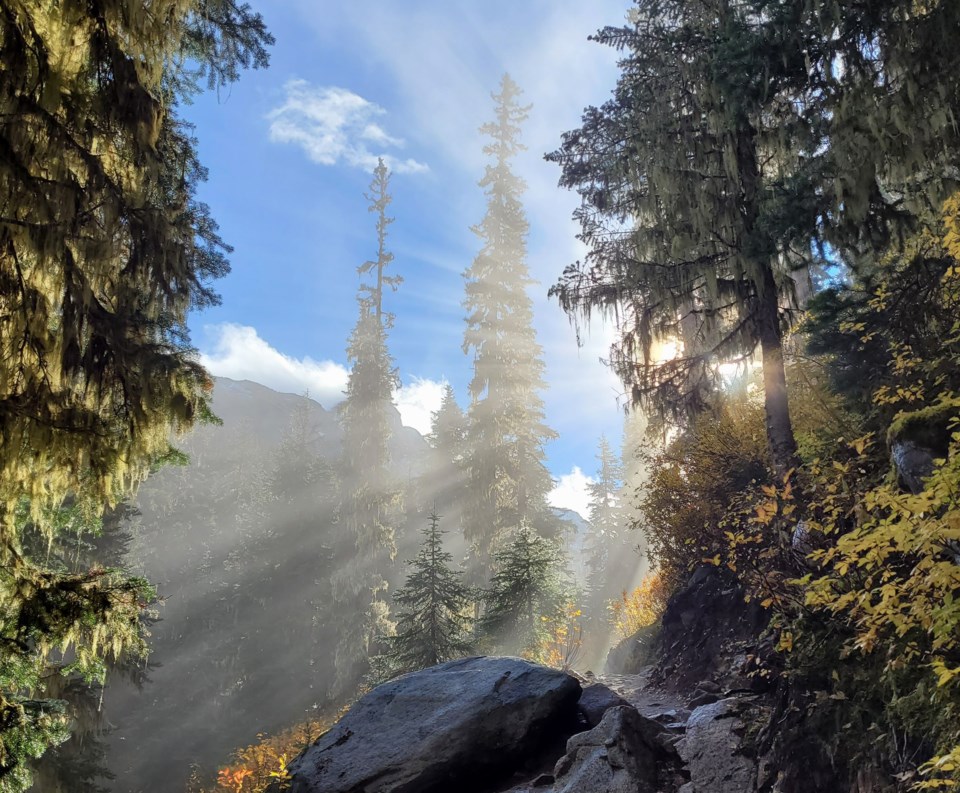There’s no way around it anymore. Pipi7íyekw/Joffre Lakes Provincial Park needs to close. Whether it’s for weeks, months, seasons or years—however long it needs to heal. Despite BC Parks capping the number of visitors per day and doing its best to manage dangerous parking practises on the Duffey Lake Road, it hasn’t been enough. This pristine place is overrun.
There are respectful park users in those crowds; folks who obey signage, pack out their trash and don’t feed already obese whiskey jacks for the sake of an Instagram story. But there are many disrespectful park users in those crowds, too, many who aren’t aware of their actions, or who don’t care enough to change their behaviour. They trample sensitive ground vegetation to take lame selfies, leave trash behind and generally treat this backcountry area as if it were an amusement park.
Pipi7íyekw/Joffre Lakes Provincial Park lies on the traditional territory of the Líl’wat and N’Quatqua Nations. It was first established as a recreation area in 1988 and in 1996 it became an official provincial park, protecting it from commercial and industrial developments.
But it needs more protection now—from us. Over the course of almost 30 years as a provincial park, the impact of visitation has increased an order of magnitude each decade.
We all know the reasons. Around 2013, BC Parks began upgrading the hiking trail to a gravel path that made it easier than ever to access the second and third lakes. Then came Instagram, the people who call themselves “influencers,” and the people who couldn’t live without a photo on that damn log (colloquially known as the “instalog,” it often has a lineup of dozens of people, all wanting the same picturesque photo that conveniently crops out the hordes of park visitors on the shores of the lake).
In 2017, dogs were banned. This was inevitable given how much dog shit wasn’t getting picked up by owners, much of it getting left to contaminate the waterways and the lakes themselves. In 2019, the park reached an all-time high of 196,300 visitors, which was an increase of 222 per cent since 2010. In 2022, following successful implementation in other BC Parks, visitors needed to register for a free day-use pass to access Pipi7íyekw/Joffre Lakes Provincial Park. This did help with people traffic, and especially with the dangerous parking that was taking place alongside Highway 99.
Last Friday (Aug. 22) the Líl’wat and N’Quatqua Nations held a two-hour protest, blocking access to the park past Mount Currie. BC Parks had ignored the Nations’ request to increase the closure dates from 60 days in 2024 to 103 days in 2025. BC Parks agreed to close the park for just 68 days.
“This is not reconciliation,” Dean Nelson, political chief of Lil’wat Nation told the CBC ahead of the protest. “This is a continuation of colonial decision-making, you know, disregarding our needs and values on the land.”
The Minister of Environment, Tamara Davidson, was interviewed on Aug. 21 by CBC’s On the Coast program and was pressed by host Gloria Macarenko on why BC Parks was not coming to the table on lengthening the closures.
“It’s a really hard challenge to find a balance between many people that want to come and have that same experience,” the minister said. “When we have visitors that are experiencing that same connection to the land, they’re the ones that are really going to fight hard to make sure that land is protected.”
Turning visitors into stewards is a romantic notion. But if you’ve hiked Joffre Lakes in the last few years, you know these handfuls of stewards are fighting a losing battle against the hordes, just like the BC Park rangers and staff are.
The Nations have stated they want this time for their cultural practices, such as hunting, fishing, harvesting medicines and engaging in spiritual activities. As Casey Gonzalez of Líl’wat Nation put it in an interview with Global News: “Our community members do not want to be gawked or watched … as they do their cultural ceremonies.”
The discrepancy on the appropriate amount of closure between BC Parks and the two Nations puts park users in an awkward position (at least the users who consider the needs of others above their own). Officially, BC Parks will close the park from Sept. 2 to Oct. 3. But the Nations have asked everyone to respect their wishes and not enter the park during their Reconnection Periods between Aug. 22 and Oct. 23. The aforementioned cultural ceremonies are part of a larger goal to assist the well-being of the two Nations’ community members as they look for traditional methods to help cope with grief, addictions, suicide and mental health. The other goal is to give the area some time to heal from the trampling of thousands of visitors every weekend.
The solution is simple. Do not go to Joffre Lakes when the traditional owners of the land ask you not to visit. BC Parks is trying to balance the Nations’ needs with the rights of its citizens to access provincial parks. So it’s up to you—the individual—to make the right decision.
This isn’t about wokeism or capitulation. We (the visitors on this land) are the ones who blew it. We succumbed to the alluring internet portrayals of this beautiful place. We fed our egos in an attempt to replicate that portrayal for our own social media accounts. If we lose access to Pipi7íyekw/Joffre Lakes Provincial Park altogether, it won’t be the fault of the traditional owners, or oven BC Parks. It will be our own doing.
Vince Shuley doesn’t want you to love it to death. For questions, comments or suggestions for The Outsider, email [email protected] or Instagram @whis_vince.




